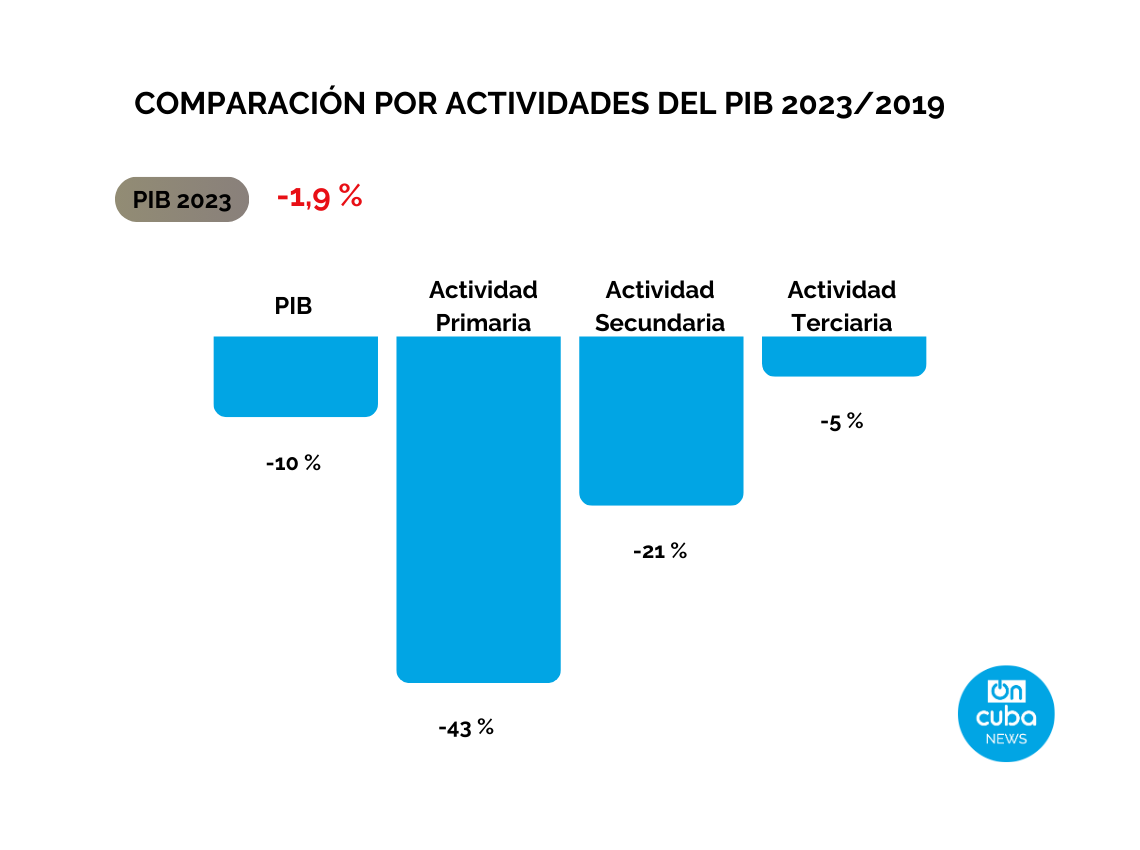The history of development has proven that having a dense business fabric is a strength for any country, at least for these reasons:
- It has a positive impact on the complementarity of the economic system,
- It contributes to increasing competition between enterprises, which also leads to encouraging innovation,
- It produces improvements in the competitiveness of enterprises.
And, while in almost all countries one of the strategic tasks of all governments, whether national or local, is to promote the growth of their business fabric, in Cuba we will undertake the second half of 2024 with policies that limit and hinder the growth of the business fabric.
The results for 2023 and those of this first semester show not only that the current situation is very difficult, but also that resources continue to be very scarce and that the internal economy and the ENTIRE business system is not capable of providing them in the short term.
On the other hand, the sources to obtain these resources are smaller and in some cases more expensive, while the international environment in political terms can become more restrictive, with special dependence on the results of the elections in Venezuela and the United States.
Some of the data in the report of the Minister of Economy before the National Assembly days ago helps to illustrate what was stated above. As its presentation is public and available to everyone ― something that we must include within the good practices of the Ministry and that should be extended to others ― I will summarize some of them below:
- It does not appear that the planned GDP growth rate will be met in 2024. Although it is true that sectors such as education and health have an important weight in the structure of the GDP, practically the majority of branches within the primary and secondary sector of the economy do not achieve the planned results. Financial restrictions and energy cuts negatively impact that behavior. The weak performance of national production and the decrease in imports make it very difficult to achieve the expected growth goal.
- Agricultural production that is decisive for feeding the population is not fulfilled; beans, root vegetables, corn, eggs, beef. Vegetables and milk.
- Exports of goods grow in relation to the first half of 2023 by 24% (249 million), but represent 88% (222 million) of the 2024 plan for the first half.
- Service exports grow compared to the first half of 2024, which is positive. Medical services stand out, which grow with respect to the plan by 12% and also with respect to 2023 by 9%. Telecommunications services, however, remain at 95% of the 2024 plan and decrease by 17% compared to the same period in 2023. The tourism sector, which has concentrated the largest volume of investments in the country, continues to show a slow recovery (growing 1.8% of 2023) and is 51.6% of what was achieved in 2019.
- Imports, an essential item in the dynamics of the economy and in the behavior of inflation due to its impact on global supply, reach 58% of the year’s plan, and are 22% less than in the first half of 2023. Imports by forms of non-state management reach 900 million dollars, of which 70% (622 million) is imported by MSMEs.
- Foreign investment grows in 12 new businesses. There is no public information on the capital involved in them. The new businesses are: 4 in food production; tourism, 3; commerce, 2; logistics, 1; industry 1; advertising services, 1.
- The national electro-energy system is not able to meet demand and continues to face both problems of breakdowns and fuel availability. Investments in photovoltaic energy are being developed that in the future can contribute to relative improvement.
- Inflation indicators improve compared to the same period in 2023. In the case of interannual inflation, this decreased from 45.48 in May 2023 to 31.11 in May 2024. However, products maintain high prices, many of them far from the reach of the majority of the population.
- It is possible to verify a sustained effort in caring for disadvantaged people, families and communities; however, this has not been able to stop the increase in inequality and poverty.
In short, the economy does not reach the growth goal, determining factors such as the performance of the national productive sector, as well as exports and imports, do not achieve the dynamics that the country needs. There is no public data on the fiscal deficit in the first half of the year. The target for 2024 was adjusted downwards from the originally conceived 18.5% to around 15%. At the same time, official figures show the moderation of inflation dynamics.
The second half of the year will pass under these conditions. The Ministry of Economy report defines 9 aspects as components of its strategy; of these, some will require a substantial change in the allocation of resources, such as boosting productive activity, especially food production and the maintenance of the national electro-energy system or increasing foreign currency income, fundamentally because the accumulated deterioration is substantial. This is shown in the graph below:

Other proposals, such as containing spending and postponing investments, making adjustments to the plan and budget, continuing work to increase discipline, and stop corruption and illegalities, decentralizing powers and improving social care, although they may require fewer resources, will require the adaptation of the associated public policies and the coordination between them.
Some of the announced measures reinforce the role of the dollar in the national economy, including:
- All transactions within the economy will be carried out in Cuban pesos, except for the Mariel Special Development Zone, authorized retail and wholesale trade entities in foreign currency, foreign entities and others that are approved.
- The foreign currency accounts of state entities will be reorganized.
- Closed financing schemes will be approved for exporters.
- The payment of tariffs in foreign currency on imports from the non-state sector will be established.
- Foreign currency charges for port services will be implemented gradually and selectively.
- Cash in foreign currency will be accepted in certain sectors and activities, such as tourism.
An expected effect should be the increase in the demand for dollars for these operations with an impact on the exchange rate between the peso and the dollar.
Another expected effect may be the reduction in the activities of MSMEs and the self-employed, which have been a driving factor in the economy, have contributed significantly to the supply of goods and today contribute to the country’s tax revenues, with 9% of total income and 15% of tax income.
Among the measures for the reorganization of foreign trade, the implementation of collection and payment operations of non-state forms of management from accounts in Cuban banks stands out.
Will Cuban banks be able to give these new enterprises sufficient guarantees that their money will be available when they need it to honor their commitments? Will it be possible to find foreign banks willing to establish operations with Cuban banks, taking into account that the compliance offices of these banks ensure that they do not violate the extraterritorial regulations of the United States against Cuba?
If we look at the performance of the first semester and the combination of some of the measures approved and others put into practice, it is possible to expect a very difficult second semester, a probable reduction in imports of goods by forms of non-state management with significant negative impacts in the reduction of the supply of some goods whose correlate — given the impossibility of the state sector to increase the supply — can be a rebound in inflationary dynamics. This will lead to a reduction in the purchasing power of the Cuban peso.
Cuba needs to grow, because sustainable development is not possible without economic growth. The growth rate for the period 2018-2023 is -1.5% annual average; if we take the year 2020 out of the series, that rate is 0.4%. At either of these two rates, it would take us more than 120 years to double per capita income.
We must add to grow, we must stimulate the growth and density of the business fabric. This growth should be encouraged, so that all Cubans find new opportunities and are encouraged to try and contribute.










